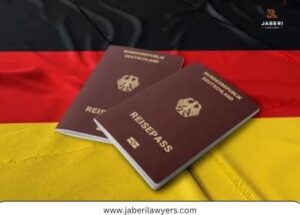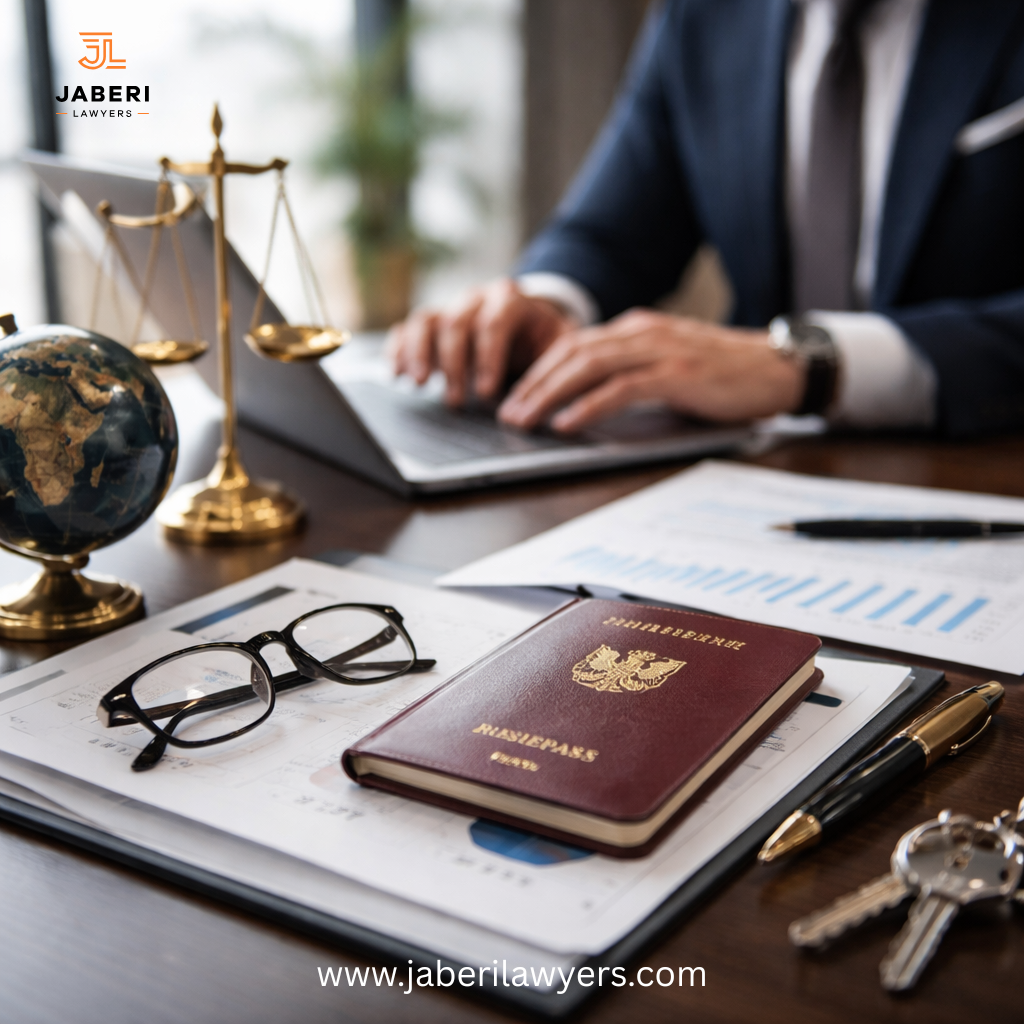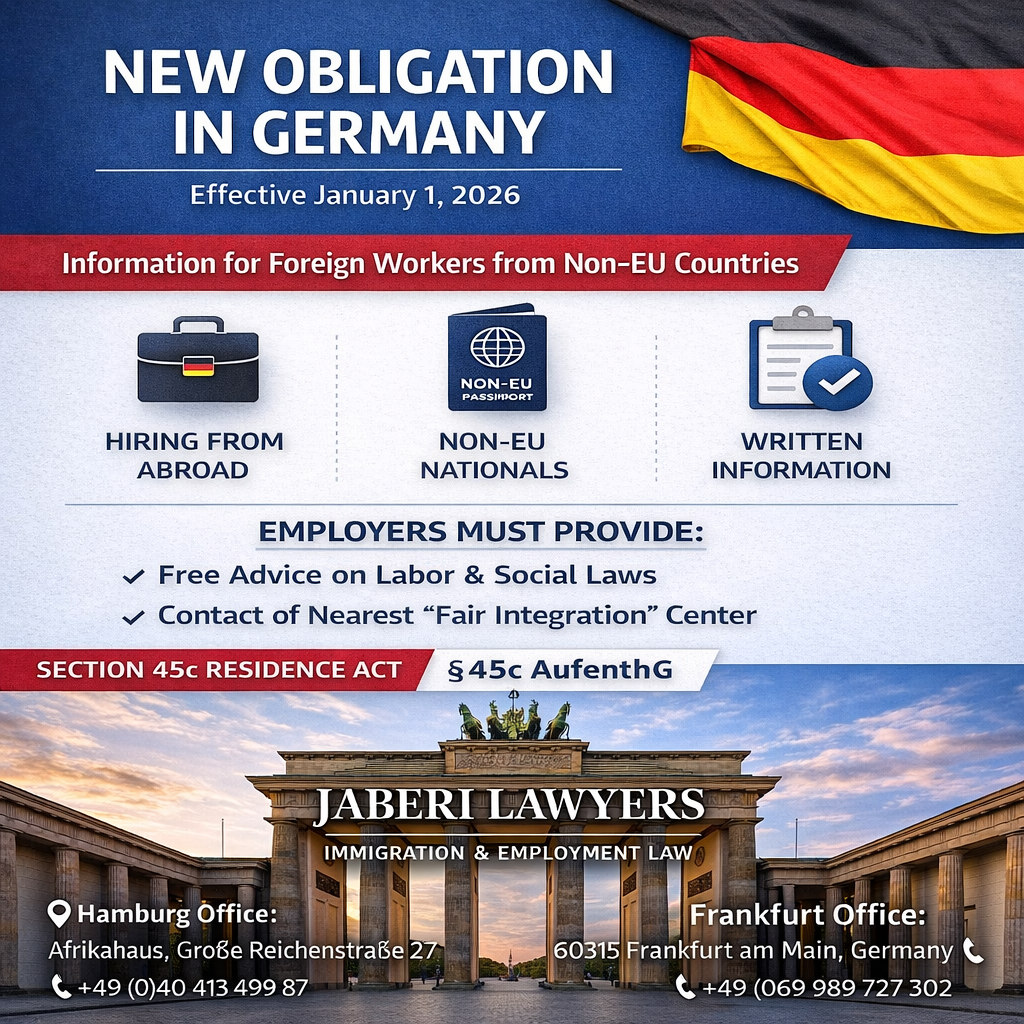Jaberi Lawyers – Where Immigration Meets Expertise
As 2025 draws to a close, family reunification remains a pivotal area of German residence law for German citizens, skilled workers, and long-term residents. Bringing your loved ones to Germany is achievable, but success depends on satisfying defined statutory and procedural requirements. At Jaberi Lawyers, we assist you every step of the way. This year-end overview outlines the key requirements, recent developments, and what you must do to prepare a successful application.
Key Takeaways at a Glance
The requirements depend on the type of residence title held by the person living in Germany (for example: German citizen, settlement permit holder, skilled worker permit).
Holders of a Settlement Permit (Niederlassungserlaubnis) or equivalent long-term residence benefit from reduced requirements for spouses and minor children, especially concerning proof of livelihood and housing in many cases.
The A1 German language certificate is usually required for spouses joining from abroad — but exceptions apply for certain highly qualified or permanent-residence categories.
A valid residence title of the sponsor in Germany is a fundamental prerequisite.
Timely submission, properly translated documents, and adherence to embassy-specific checklists are essential to minimise delays.
General Requirements for Family Reunification
To apply successfully, both the person residing in Germany (the sponsor) and the family member abroad (the applicant) must meet certain core requirements.
Sponsor in Germany
Valid residence title that permits or allows family reunification (or German citizenship).
Adequate health insurance coverage for applicant and family.
Proof of adequate housing — if required by their residence category.
Proof of livelihood (income) — unless the sponsor’s title falls under a category where this is relaxed.
Proof of family relationship (marriage certificate, birth certificate) — originals and certified translations as required.
Disclosure or declaration of commitment (Verpflichtungserklärung) where required by the embassy.
Applicant abroad
Valid passport or legally acceptable substitute.
Proof of family relationship (e.g., marriage or birth certificate; certified and translated if required).
In many cases: A1 German language certificate — unless your case qualifies for an exception.
Visa application for a residence permit if entering Germany for family reunification.
Family Reunification for Settlement Permit (Niederlassungserlaubnis) Holders
If you hold a settlement permit or a long-term EU residence permit, the rules are more favourable: for your spouse or minor children joining you in Germany, authorities in many cases waive detailed checks on livelihood or housing, focusing primarily on the genuine family relationship and the identity documentation. Nevertheless, the local Foreigners’ Office may still request supporting documentation, so professional preparation remains important.
Family Reunification for Skilled Worker Permit Holders
For holders of a skilled worker permit (e.g., Blue Card, recognised foreign professional) who wish to bring spouse and minor children:
The sponsor must hold a valid qualified employment permit and have sufficient income and housing under normal rules.
In many of these cases, the A1 German certificate for spouse may be postponed (for example, if the sponsor holds a Blue Card or equivalent).
The specific requirements may differ from one Foreigners’ Office to another; review your category carefully.
Family Reunification with German Citizens (§28 AufenthG)
When the sponsor is a German citizen, the process is usually less complex:
Vital requirements: proof of German citizenship, valid passport(s) for applicants, and family relationship documentation.
Both spouses must generally have reached the age of 18 at marriage, unless special circumstances apply.
A1 German is normally required for the spouse — but exceptions apply in cases of medical or practical reasons.
Proof of livelihood/housing is often not required in the same way it is for non-citizens, making this route comparatively straightforward.
Special or Hardship Situations
If you seek family reunification due to serious hardship (for example: critical illness of a parent, significant care dependency), you should document:
Medical certificates and reports proving the health condition or dependency.
Evidence of why care cannot be provided in the origin country or why delay causes significant hardship.
These cases are assessed individually by the Foreigners’ Office; legal assistance helps to present a compelling case.
Practical Tips to Avoid Delays
Use the specific visa checklist from the German embassy/consulate in the applicant’s country: it lists exact documents, translation and certification rules.
Translate bilingual documents or get certified translations; ensure their validity matches embassy guidelines.
Confirm in advance whether the spouse must pass A1 German before the visa appointment, or whether an exception applies.
Consider submitting a Verpflichtungserklärung (declaration of financial commitment) if required by the embassy.
Ensure all identity documents, family relationship certificates, and the sponsor’s residence title are clear, valid, and legally recognised.
Why Choose Jaberi Lawyers
At Jaberi Lawyers, we specialise in German immigration and residence law, including family reunification. We provide comprehensive support for your case:
We determine the correct section of the Residence Act relevant to your situation.
We assist with document preparation (translations, certifications, relationship proofs).
We draft and review declarations of commitment and hardship dossiers.
We act as your legal contact with the Foreigners’ Office and embassy if needed.
Headquarters:
Jaberi Lawyers
Afrikahaus Große Reichenstraße 27
20457 Hamburg
📞 +49 (0)40 413 499 87
📧 contact@jaberilawyers.com
🌐 www.jaberilawyers.com







